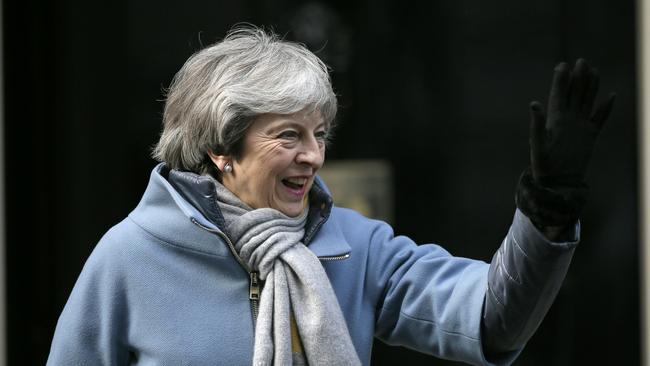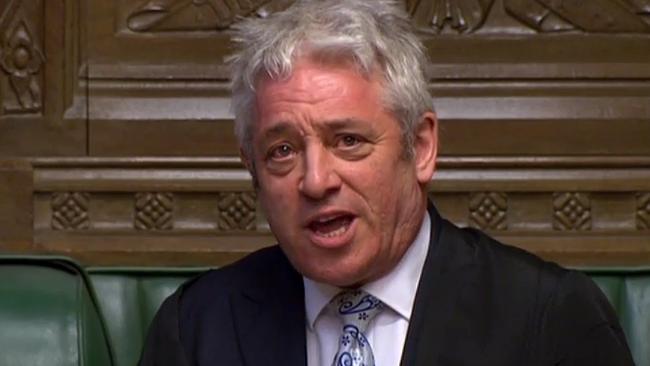Brexit: Vote to extend March 29 deadline passes 412 to 202
Theresa May will ask the EU to extend the Brexit deadline after MPs voted overwhelmingly for an extension to Article 50.

Theresa May will ask Europe to extend the Brexit deadline after the British parliament this morning voted overwhelmingly for an extension to Article 50 by 412 to 202.
The Prime Minister was overwhelmingly supported by the parliament to request a short technical extension until June 30 if her withdrawal deal is agreed by March 20, or, if no deal is agreed, for a longer extension.
Article 50, the mechanism which triggers Brexit, has had a March 29 deadline but the government has run out of time to agree the withdrawal deal or come up with a viable alternative solution.
Mrs May’s motion to extend the deadline was won by a majority of 210, with 412 voting for and 202 against. It was a rare evening of good news for Mrs May, who was able to fend off a series of amendments to her own motion.
Mrs May is now expected to table her withdrawal bill next week for a third vote so she can go to a meeting of European leaders later in the week knowing whether she requires a short or long extension to Article 50.
EU leaders have said they have no issue with a short extension, but the longer request may not have the required unanimous support from all 27 member states.
One idea being floated is that the UK will have to pay a hefty monthly charge for a long extension.
Earlier, an amendment calling for an article 50 extension to allow time for a second referendum was heavily defeated after Labour leader Jeremy Corbyn ordered his MPs to abstain.
However Mr Corbyn this morning reiterated Labour’s support for the public vote. “This is not about political point scoring but about a realistic option to break the deadlock,’’ he insisted.
Scottish Nationalist Ian Blackford retorted that it was “utter hypocrisy, they fudged the opportunity to support the people’s vote.’’
Bid to seize control fails
Earlier, the British PM was given a huge confidence boost in a different vote when she narrowly fended off parliamentary control of the Brexit process.
Mrs May, ordering a “heavy three line whip’’ disciplined her MPs to fall into line and vote against a motion which would have given backbenchers control.
But the amendment brought by Labour’s Hilary Benn to take over parliament was lost by a margin of just two votes, illustrating Mrs May’s precarious hold on control of the Conservatives.
Still, the result was the first glimmer of hope for Mrs May that her Brexit deal could be reintroduced to Westminster for a third time early next week.
Mr Benn’s cross-party amendment would have given control of parliamentary time next Wednesday to a series of backbench suggestions to find a Brexit solution that could garner majority support. It could have also allowed a much longer delay of article 50.
Despite the hairline vote, the pro-government result was a turnaround from the chaos of yesterday, where four Cabinet ministers defied the whip and abstained from voting, leading to the government losing its motion to limit a no deal Brexit to March 29. Instead an amendment calling for a no deal Brexit for all time was passed.
But in an analysis of the voting patterns for the Benn amendment it emerged that 16 Tory Remain MPs voted for the amendment, in contravention of the whip. Another six Labour MPs, all Brexiteers, also defied Mr Corbyn’s wishes and crossed the floor to vote against the amendment.
But Mr Benn said the government had agreed that they will allow amendable motions by Monday March 25..
“We will still achieve what we want, it will be six days later than we wanted,’’he said.
Meanwhile the Labour motion calling for parliamentary time to find a majority for a different approach was defeated by a majority of 16, 302 votes to 318.
An earlier motion to extend Article 50 in order to hold a second referendum was roundly defeated after the Labour party was whipped to abstain.
Labour frontbencher Ruth Smeeth resigned to vote against the amendment, rather than abstain.
I've resigned from Labour's front bench this evening in order to vote against a second referendum. This was a difficult decision but I have a duty to support the will of my constituents. We need to leave, and leave with a deal that works for the Potteries https://t.co/yOtP1jWsmS
— Ruth Smeeth MP (@RuthSmeeth) March 14, 2019
Labour backed the advice from lobbyists, the People’s Vote, to not back the Wollaston amendment as they felt it was not politically or tactically the right time to get maximum support. Labour leader Jeremy Corbyn wanted his members to focus on the later amendments. Only 85 MPs voted for it, with 334 against.
The Independent Group’s Sarah Wollaston, who tabled the amendment told Sky News that it was a false promise that the Labour party would move to back a people’s vote. ’’It’s clear they don’t, we had the opportunity to show there was growing support for this, it’s a great shame,’’ she said.
Earlier, Speaker of the House John Bercow was accused of ‘Brexit bias’ after allowing the amendment but rejecting another amendment opposing one.
Mr Bercow has allowed four amendments to be voted on today.

Meanwhile Donald Trump intruded on the debate, telling Northern Ireland Taoiseach Leo Varadkar that he wanted to avoid a hard border in Northern Ireland.
After a meeting with Mr Trump at the White House, Mr Varadkar told reporters: “It’s not particularly support that I’ve asked for from the president on Brexit.
“What I’ve asked for is an understanding of our situation, particularly when it comes to Northern Ireland and avoiding a hard border and protecting the peace process.
“And he is supportive of that point.”
The new controversy came ahead of today’s vote on whether to extend the deadline for the UK to leave the European Union, after parliament twice rejected Theresa May’ withdrawal bill and yesterday ruled out leaving the EU without an agreement under any circumstances.
Today’s vote is on whether to seek a delay of at least three months to Brexit, but will be complicated by EU leaders who have warned they will only allow a delay if the UK agrees a deal.
The PM yesterday issued an ultimatum to parliament: agree to her withdrawal bill when she brings it back to the House for a third time next week or face delaying Brexit for years.
She is proposing that Brexit be delayed until June 30 — but only if parliament approves her Brexit deal. She has warned Brexit supporters who oppose her deal that if no withdrawal agreement is passed in the coming days, the only option will be to seek a long extension that could mean Brexit never happens.
Any delay in the Brexit process would require the unanimous approval of all 27 remaining EU member states.
European Council president Donald Tusk said today he would urge EU leaders to consider giving the UK a “long extension” to Article 50 to provide time for Britain to “rethink” its Brexit strategy.
Guy Verhofstadt, the European Parliament’s Brexit co-ordinator, said the EU would “under no circumstances” agree to an “extension in the dark”.
“Unless there is a clear majority in the House of Commons for something precise, there is no reason at all for the European Council to agree on a prolongation,” he said.
Other amendments include an attempt to prevent Mrs May from bringing her divorce deal back for a third vote.
As it stands, the Prime Minister’s motion calls for a short extension of article 50 if the British parliament passes the withdrawal bill before Wednesday.
It then says that if the bill is not passed then the European Council would highly likely require a clear purpose for any extension.
Any request for a delay would still have to go before EU leaders at a summit in Brussels next Thursday and Friday.
They have already stated that they will only agree to push back the Brexit date if Britain makes concrete proposals to break the crisis.
Unless British MPs agree to the deal or EU leaders unanimously approve a delay, Britain would still have to crash out of the EU with no deal in place on March 29.
The EU has also been reluctant to have any extension that would interrupt its European parliament elections from May 23-26.






